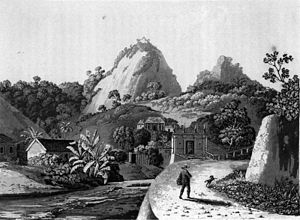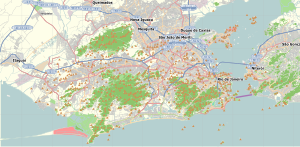This article needs additional citations for verification. (July 2014) |
Laranjeiras (Portuguese pronunciation: [laɾɐ̃ˈʒejɾɐʃ], orange trees) is an upper-middle-class neighborhood located in the South Zone of Rio de Janeiro, Brazil. Primarily residential, It is one of the city's oldest neighborhoods, having been founded in the 17th century, with the construction of country houses in the valley located around the Carioca River, which bordered Corcovado Mountain. Because of this, the neighborhood was previously called Vale do Carioca, or Carioca Valley.
Laranjeiras | |
|---|---|
Neighborhood | |
 | |
| Coordinates: 22°56′09″S 43°11′20″W / 22.93583°S 43.18889°W | |
| Country | |
| State | Rio de Janeiro |
| Municipality | Rio de Janeiro |
| Zone | South Zone |


While primarily residential, several important governmental, cultural, and sports institutions and schools make this a bustling neighborhood. Well known landmarks in Laranjeiras include the Guanabara Palace (seat of the state government of Rio de Janeiro), the Palácio Laranjeiras (official residence of the state's governor), and the Parque Guinle (Eduardo Guinle Park), as well as the headquarters and Laranjeiras Stadium of Fluminense Football Club, and Rio's branch of the Hebraica Social and Sports Club, and several others.
Laranjeiras is adjacent to the Cosme Velho, Catete, Flamengo and Botafogo Neighborhoods.
Infrastructure
editLaranjeiras' main streets (ruas) are:
- Rua das Laranjeiras
- Rua Conde de Baependi
- Rua Pinheiro Machado
- Rua General Glicério
- Rua Pereira da Silva
- Rua Alice
- Rua São Salvador
- Rua Gago Coutinho
- Rua Mário Portela
- Rua Sebastião Lacerda
- Rua Cardoso Júnior
- Rua Pires de Almeida.
- Rua Ipiranga
- Rua Soares Cabral
- Rua Almirante Benjamin Sodré
- Rua Álvaro Chaves
- Rua Moura Brasil
People
editWell-known people that live, or have lived in Laranjeiras include:
- Cartola (Angenor de Oliveira), singer, composer and poet.
- Cássia Eller, singer.
- Machado de Assis, writer.
- Mel Lisboa, actress.
- Paulo Gracindo, actor.
- Heráclito Fontoura Sobral Pinto, human rights lawyer.
- Oscar Niemeyer, architect.
- Adriana Lisboa, author
- Carola Saavedra, author
Events
editGeneral Glicério Fair:
The fair takes place every Saturday morning at General Glicério street. It is a traditional event for the residents of the neighborhood, where you can find fresh fruits and fishes, as well as the favorite Brazilian fair food, sugarcane juice and "pastel" (fried pie). Families and friends can also enjoy great Choro music or "Chorinho", an instrumental Brazilian popular music genre which originated in 19th century Rio de Janeiro.
Education
editThis section needs expansion. You can help by adding to it. (January 2015) |
The Lycée Molière de Rio de Janeiro or Liceu Molière, the French international school, is in this neighborhood.[1]
References
edit- ^ "Accueil"/"Início." Lycée Molière de Rio de Janeiro. Retrieved on 22 January 2015. "Notre établissement situé dans le quartier résidentiel de Laranjeiras accueille plus de 750 élèves de la Petite section Maternelle à la Terminale."/"O nosso estabelecimento situa-se no bairro residencial de Laranjeiras e acolhe mais de 750 alunos da Educação Infantil ao 3° Ano do Ensino Médio."
External links
edit- Os Bairros (the districts of Rio de Janeiro, in Portuguese)

